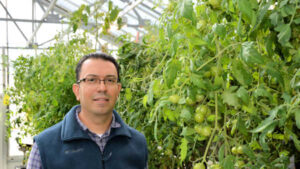Texas A&M researcher’s technology has promise to supercharge food production and usher in an era of customized medicine.
A Texas A&M University researcher’s work could redefine how we grow our food and treat diseases. This cutting-edge technology is known as Gene-Based Breeding (GBB). It’s an innovative approach that not only promises to drastically boost crop yields and livestock quality but also holds the potential to transform medical treatments for both humans and animals.
Imagine a world where farmers can cultivate crops and livestock that are not only high-yielding but also resistant to climate change and diseases. That’s what GBB is set to offer, using precise genetic information to enhance breeding processes in a way that’s faster, more predictable, and cost-effective than ever before.
“Gene-Based Breeding is like designing a super crop or livestock breed in a lab, using the best genetic traits available,” explained Hong-Bin Zhang, in a peer-reviewed article published in Maximum Academic Press. He wrote that by focusing on the specific genes that control important traits like yield and disease resistance, GBB enables the development of new plant and animal varieties with precision.
This isn’t just about improving the size of your tomatoes or the milk yield from cows. The implications are far-reaching, including significant enhancements in the nutritional quality of food and the environmental sustainability of farming.
“It’s about ensuring food security for a rapidly growing global population under the shadow of climate change,” the researcher explained in the paper.
The benefits of GBB extend beyond agriculture. This technology is also paving the way for what’s called molecular precision medicine in humans and animals. By understanding the genetic makeup that defines health and disease, medical professionals can move away from a one-size-fits-all approach to treatment and towards more personalized medical care that’s based on individual genetic profiles.
The paper described that in the future, gene-based clinics could tailor treatments and preventive measures for patients based on their unique genetic predisposition to certain diseases.
With promising research and numerous successful applications in plants like cotton and maize, as well as in livestock, GBB could revolutionize agriculture and healthcare. It makes farming more efficient and medical treatments more precise, aligning with the needs of the 21st century.
As the world continues to face challenges like population growth and climate change, innovations like Gene-Based Breeding offer hope. It’s not just about growing more food or creating healthier animals; it’s about creating a sustainable future where technology and biology work hand in hand to improve our lives on multiple fronts.













